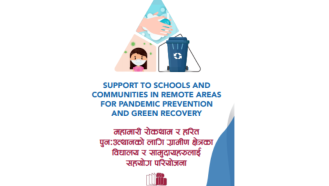Support to Schools and Communities in Remote Areas for Pandemic Prevention and Green Recovery
Summary
The Government of People’s Republic of China and United Nations Development Programme (UNDP) jointly launched an initiative which aims to pilot an integrated approach to community resilience building for schools and communities in Mahesh province with a focus on enhanced access to essential services and basic infrastructure. The approach is to build capacity of community schools, students, and families with tailored interventions to help build an environment to cope with pandemic like situation and natural disaster for enhanced access to education. Particular attention is given to ensuring female students have safe learning environment by equipping schools with gender-sensitive toilets and reusable sanitary pads. On the top, health safety and recovery of the children’s families and the associated communities are paramount and accordingly it provisions to support for necessities of the life to support related families for better environment and health safety.
Background
With over two-thirds of the population living in rural areas, Nepal is highly vulnerable to multi-disaster risks such as earthquakes, floods, landslides, drought, and epidemics. Disaster vulnerability is exceptionally high for communities and schools in fragile settings. A total of 8,242 community schools were affected by the 2015 earthquakes, and about a million children found no school building to return to. During the 2020 pandemic and lockdown, when all schools were closed, only five percent of children in the poorest households had access to distance learning. In Madhesh province, the informal economy and poor sanitation and infrastructure exacerbated the vulnerabilities of communities against shocks. The higher school dropout rate of girls over boys is prevalent, as girls are more likely associated with household chores, helping parents in the kitchen, and babysitting. Female students tend to stay home when they have periods because of the absence of gender-segregated toilet facilities at schools.
Key Results
- Upgraded classroom learning environment and WASH facilities in 32 community schools through furniture and equipment/material support.
- Enhanced health safety of 18,000 students from pandemic through provision of health protection and sanitation equipment/material support.
- Ensured health safety and recovery of 7,500 children’s families from the pandemic impact and extreme environment.
GESI Component
The project will ensure that students irrespective of their gender, disability, or background are protected against pandemic and shocks and enjoy safe learning environment. Out of the targeted 18,000 students (50% girls) students from 30 community schools will be supported by this project.
Project Outputs
- Classroom learning environment and water and sanitation facilities in schools improved through furniture and equipment/material support.
- Health and safety of the students from pandemic enhanced through provision of health protection and sanitation equipment/materials support.
- Health safety and recovery of the children’s families and the associated communities from the pandemic impacts and extreme environment ensured.
Publications
Project Details
| Project Status | Active |
| Project Period | September 2023- March 2025 |
| Project ID | 01000542 |
| Geographic Area | 32 schools of 9 Municipalities of Rautahat and Sarlahi District in Madhesh Province. |
| Source of Funding | China Aid |
| Budget | USD 1,550,000.00 |
CONTACT DETAILS
| UNDP Focal Point | Project Focal Point |
| Kalpana Sarkar Portfolio Manager UN House, Pulchowk, Lalitpur GPO Box 107, Kathmandu, Nepal Email: kalpana.sarkar@undp.org | Rajesh Verma Project Manager UN House, Pulchowk, Lalitpur GPO Box 107, Kathmandu, Nepal Email: rajesh.verma@undp.org |

 Locations
Locations









